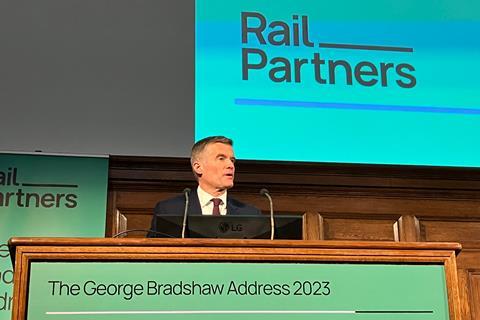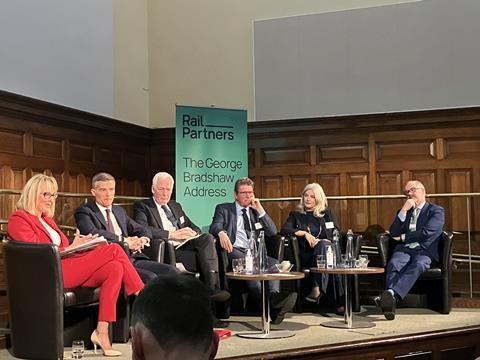
UK: Private sector train operators will have a key role to play in the reformed rail structure, Secretary of State for Transport Mark Harper told industry leaders on February 7.
Presenting the annual George Bradshaw Address hosted by industry association Rail Partners, Harper sought to set out his vision for reform of the UK rail sector, building on the Plan for Rail white paper published in May 2021. Insisting that ‘Britain is yearning for a modern railway that meets the needs of the moment’, he said the government was working to deliver ‘fundamental reform’, and having taken stock of the situation since being appointed in October he would ‘re-energise that process’.
Responding to the findings of the Williams review, which called for ‘a more customer-focused and joined-up railway’, Harper said the reforms needed to ‘enhance the role of the private sector, not just in running services, but in maximising competition, innovation and revenue growth across the industry’.
Emphasising the importance of balancing revenue and costs, Harper said repeatedly that it was ‘mad’ that at present the Department for Transport was responsible for the railway’s costs while all revenues passed directly to the Treasury. ‘Joining up the P&L’ would be an urgent priority.
Expressing concern about the current level of micromanagement by DfT, he said it was ‘not the role of ministers to pore over operational decisions. I shouldn’t need to approve whether a passenger train ought to be removed from the timetable to allow a freight train to run’. Rail Business UK understands that this relates to a pathing issue on the Great Eastern Main Line.
Guiding mind
Confirming that the government would press ahead with establishing Great British Railways as ‘a guiding mind to co-ordinate the network’, Harper said this would be the ‘single point of accountability for the performance of the railway’, which would be ‘responsible for track and train as well as revenue and cost’. To that end, the GBR Transition Team was developing a guiding ‘long-term strategy for rail’, which ‘we will publish later this year’.
Harper emphasised that ‘taking politics out of the railway is the only way to build a truly commercially-led railway, and for me that is non-negotiable’. As an arms-length body GBR would ensure a ‘balanced approach’ to both infrastructure and operations, with ‘both sides ultimately delivering an efficient high-performing railway for customers’. Operational control would be delegated to ‘industry experts in five regional GBR divisions’.
However, he insisted that GBR should play a co-ordinating role rather than centralising decision-making, leaving much of the detail to industry players, in co-operation with regional administrations focused on local requirements. ‘More Slim Controller than Fat Controller’, he explained.
Asked about the likely timescale for legislation to establish GBR, DfT insiders explained that this would depend on getting a slot in the legislative process, but they hoped it could be achieved by the end of 2024. Meanwhile, Harper said, ‘we are not going to wait for that’, as there was much that could be achieved without legislation, and work would be pressed forward as fast as possible. ‘Over the next couple of years, passengers will see some tangible improvements’, he promised.
Entrepreneurial input
Admitting that the train operating companies had expressed reservations about the degree of central control envisaged in the original Plan for Rail, where GBR would set detailed timetables and simply contract out day-to-day operations, Harper said ‘we shouldn’t be afraid to let Managing Directors of train operating companies actually manage and direct their operations’.
Recognising that in the past ‘some operators took on more financial risk than they could handle’, he insisted that ‘risk will sit where it is best managed … but only where it drives the best outcomes for passengers and taxpayers’. As such, new Passenger Service Contracts should ‘balance the right performance incentives with simple commercially-driven targets’. He anticipated that this would encourage innovation to attract more business and drive up revenues, although ‘these contracts won’t be a one-size fits all approach’.
Citing the non-rail property and commercial businesses of many Japanese private railways, Harper suggested that there should be more scope for UK rail companies to expand commercial activities around ‘land and property near stations’, where investments ‘could generate income for the railway’.
At the same time, he confirmed that the government was keen to encourage more open access operators who could provide passengers with ‘greater choice and more direct links’, growing new markets and ‘making best use of spare capacity on the network’. DfT insiders explained that this would require a review of track access charges to ensure a more equal pricing regime for all operators.
Insisting that the post-pandemic revenue shortfall of £125m to £175m per month was ‘financially unsustainable’, Harper said a customer-focused approach was essential to driving up revenues. Asked whether this meant making passengers pay more, he said there were two options to balancing the books — cutting cost and reducing services, which would lead to further decline, or increasing the use of the rail network and thus bringing in more revenue. He felt the latter was ‘the only way to a thriving, growing, sustainable railway’.
Responding to the Rail Delivery Group’s call for comprehensive reform of fares and ticketing, Harper said the issue ‘tops passengers’ lists of biggest concerns’. He announced that the current trial with single-leg pricing on selected LNER routes would be extended ‘to other parts of the LNER network from the spring’, but government would ‘carefully consider the results of these trials before extending more widely’. This suggests that there is still Treasury concern about ensuring that fares reform does not result in a loss of revenue.
Harper insisted that ‘this is not about increasing fares — I just want passengers to benefit from simpler ticketing that meets their needs’. However, as a further experiment, he said there would be a trial of demand-based pricing on some LNER services, in order to ‘better manage capacity’ as well as raising revenue, learning from aviation.
Focus on freight
While much of the focus was on the passenger railway, Harper recognised the importance of rail freight, insisting that ‘we cannot overstate rail freight’s untapped potential for green growth. So I intend to create a duty to ensure the new industry structure realises that potential’.
GBR will have a dedicated Strategic Freight Unit, ‘tasked with creating better safeguards and more national co-ordination’. A long-term freight growth target is to be published ‘later this year’, which is expected to underpin future decision-making in balancing the operational and commercial requirements of the passenger and freight sectors. A similar freight growth target is already in place in Scotland.
Industry response

Responding on behalf of the passenger operators, RDG Chair and First Rail Managing Director Steve Montgomery said the industry needed ‘to move on after the pandemic’. He welcomed the ‘recognition that the private sector has a role’ in facilitating innovation, and that ‘we can re-engage and move forward’. However, he felt there was a ‘need to push the legislation through faster’, which would ‘lay the foundations’ for putting the customer at the heart of the industry.
GB Railfreight Managing Director John Smith welcomed the focus on freight, emphasising that this was an entirely commercial business, and ‘there are a lot of good people in the industry’. He felt Harper had provided the ‘clarity’ needed to facilitate further private investment, but ‘we need the protection of the strategic freight target incentivising GBR’.
Estimating that the government had put more than £120bn into the UK rail sector over the past decade, Porterbrook’s Mary Grant emphasised the scope for attracting more private investment, but pointed out that this depended on having a long-term strategy that recognised the value of assets with a life of 30 years or more.
Breathing a ‘deep sigh of relief’, Network Rail Chief Executive Andrew Haines welcomed the ‘drive to be customer-centric’, adding that having a ‘sense of leadership is really important’. He felt that having a clarity of purpose would help to attract ‘new blood and new energy’ into the rail sector.
Haines noted that some key decisions would be needed if the country were to maximise the benefits of public investment in major projects such as HS2, Northern Powerhouse Rail and the Transpennine Route Upgrade, and this required close consultation with regional authorities.
Railway Industry Association Chief Executive Darren Caplan said RIA members would ‘welcome the clarity on rail reform’. Harper’s confirmation that GBR would be ‘a strategic guiding mind rather than a controlling mind’ was ‘essential to ensuring that rail projects are delivered cost-effectively and efficiently’, he added. The Transport Secretary had gone ‘some way to providing reassurance’ on concerns raised by the supply sector, and the commitment to publish a long-term strategy for rail was ‘very welcome’. However, Caplan said ‘more still needs to be done to ensure there is a smooth and visible pipeline of work during what will be a period of significant change for the industry’.


![Freightliner 66503 with containers[1][1][1]](https://d1c4d7gnm6as1q.cloudfront.net/Pictures/100x67/1/0/8/62108_freightliner66503withcontainers111_851010.jpg)
